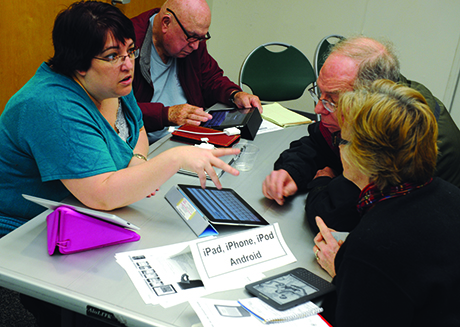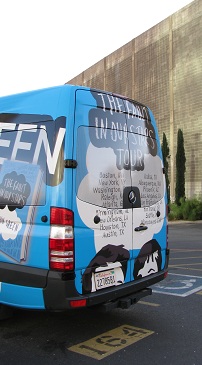Librarians Help! Excellence, Education, and Innovation
The Carnegie Corporation has a wonderful article on their site, “Today’s Public Libraries: Public Places of Excellence, Education, and Innovation.” This picture was taken at one of the libraries in my own system.
Here are some sections I particularly like:
The second reason libraries persist is the notion of improvement, something that has been an article of faith among librarians and their civic backers for as long as there have been libraries in this country. We Americans were early proponents of universal education and individual initiative, and we long ago recognized the importance of giving people a chance to make their lives better by gaining knowledge and cultivating their minds—in other words, improving themselves both materially and intellectually. It’s an idea redolent of Ben Franklin and Samuel Smiles, Horatio Alger and even Dale Carnegie.
Visiting the Flushing library helped me realize that libraries persist because the marketplace, with all its many splendors, provides no good alternative to these comforting institutions where you can sit and think without a penny in your pocket. Libraries also persist because the idea of improvement persists—and because libraries continue to meet the needs of their patrons, perhaps even better than they have in the past. Library layouts have been evolving in recent years to accommodate different groups of patrons—just as they did years ago, to accommodate children. Librarians also have more training nowadays, not just in using computers but in communicating with patrons. And they are using the tools of the digital revolution—the very ones that were supposed to make librarians obsolete—to do a better job for the public, for example by promoting community discussions online, offering help on the Web and using Twitter to keep patrons informed.
In New York City, in Chicago, in Los Angeles and so many other places that are magnets for immigrants, libraries provide reading material in a host of tongues, not to mention instruction in the English language and workshops on how to become a citizen. They still provide books, of course, but they also provide Internet access for those who lack a connection, a computer or even a home. In smaller communities, they remain cherished civic and cultural spaces, anchoring sometimes tattered main streets and serving as a destination for children after school and the elderly after a lifetime of work. This idea of improvement—of helping people to make their lives better through knowledge, just as Andrew Carnegie sought to do through his vast international library-building program—is what ties together all the things libraries do today.
Yet even with the Internet at their fingertips, Americans still need—and want—their public libraries, even if only as a place to access the Internet. Most of us, though, want and expect much more from our libraries, and that’s reflected in every measure of public attitudes toward them. Consider that homes near libraries sell for higher prices. Two-thirds of American adults say they visit a library at least once annually. Last year voters approved a remarkable 87 percent of library operating ballot measures, suggesting that taxpayers overwhelmingly believe they are getting their money’s worth from these venerable and much-loved institutions.
Instead, librarians can focus on their unique capabilities as repositories, organizers and guides to knowledge. They can provide a focal point for their communities, as well as a necessary refuge. And they can carry forward the faith in improvement that has sustained them all along. By upholding their great tradition of public service, libraries will continue to win public support—and, it is hoped, public dollars. It’s a great bargain for society, and one likely to keep libraries in business long into the digital future.
The whole article is excellent, talking about the same thing I’m trying to emphasize here — how many different ways libraries and librarians help their communities.
And it’s been awhile since I posted about the things I’ve gotten to do myself.
A big summer theme is parents or grandparents coming in, looking for books to tempt their children, with the children along. That’s one of my favorite questions, and I usually offer them several choices. I love when a child’s eyes light up with interest. One little boy said, “That looks interesting!” when I showed him the book The Polar Bear Scientist. I found him some fiction and nonfiction that he found appealing.
I always like to stress to kids that they are allowed to stop reading if they don’t like it. I try to give them several possibilities, in hopes that something will spark their interest. That won’t work if they feel obligated to read my suggestions all the way to the end. Summer reading should be non-required reading, and a big huge part of summer fun.
I’m a lot more frustrated with parents who come in with lists or who only want books from a list. In the first place, parents in the same area use the same lists, and they tend to be checked out. (Put them on hold from home if you just want those particular books!) But when the parents are willing to talk to me and get similar suggestions, when they have a little flexibility, and especially when they bring their kids, then we can find some wonderful choices.
A fun thing happened one day at the end of July. Three different kids on the same day asked where the books by Roald Dahl were, but none of them knew his name. Instead, one asked for books by the author who wrote The BFG, the next one asked for books by the author of Matilda, and the third one asked, “You know James and the Giant Peach? Are there more books by that author?”
Also this month, one of my co-workers put on a “Book Bingo” program that was a big hit. They play bingo with a modified card (using book titles), and the prizes are — books. We use gently used donations that the system doesn’t need. Some are wrapped, and there are opportunities to exchange for a title a child wants. What I love about it is how enthusiastic the kids were and how excited about their winnings. It’s a super simple program, but what a great way to get kids excited about reading.
But my favorite question of the last month or so was the guy who walked nervously up to the information desk and asked, “Where’s the nearest exit?” Now, mind you, we have one main entrance and exit to the library, and it’s quite obvious from the information desk. He got me wondering if there was a specific reason he wanted the nearest exit, and I evaluated whether the nearest emergency exit was nearer than the main entrance. I decided it wasn’t and pointed him to the big doors through which he must have entered the library in the first place.
Did he know something I didn’t know? I have to admit, I was relieved when no alarm went off in the next five minutes.
Spread the word — Librarians Help!
Disclaimer: The views expressed here are entirely my own and do not in any way reflect those of my employer.


